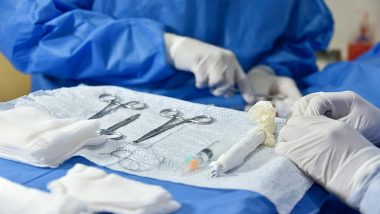Washington, August 16: According to a new research, vaccination against SARS-CoV-2 substantially lowers the risks of breakthrough infections and death due to COVID-19 in adult organ transplant recipients.
The findings of the study were published in the journal 'Transplantation', the official Journal of The Transplantation Society and the International Liver Transplantation Society. The journal is published in the Lippincott portfolio by Wolters Kluwer.
Also Read | Light Therapy Helps Burn Injuries Heal Faster, Finds Study.
Transplantation Editor-in-Chief Jeremy R. Chapman, MD, commented, "These studies show that vaccine protects transplant patients and cuts mortality by about half, but sadly deaths are still much higher in transplant patients than in the vaccinated general population."
Chapman added, "The message to patients is clear - get vaccinated, but carry on being very cautious, wear masks, maintain distances and don't get into crowds."
Also Read | COVID-19 During Pregnancy is Associated With Preterm Birth: Study.
Vaccination 'critically important' for organ transplant patients
A research letter by Rommel Ravanan FRCP and associates of NHS Blood and Transplant, Bristol, reported on their analysis of UK registry data on 48,213 transplant recipients (solid organ or islet cell), 39,727 of whom had received two doses of SARS-CoV-2 vaccine (Pfizer/BioNTech or Oxford/AstraZeneca).
The rate of COVID-19 infection decreased from 51 per cent in unvaccinated patients to 19 per cent in those receiving one vaccine dose, to 0.36 per cent in those receiving two doses.
Fully vaccinated transplant recipients were also at a significantly lower risk of death from COVID-19.
Among patients who tested positive for SARS-CoV-2, mortality was 7.7 per cent for those who had received two vaccine doses, compared to 12 per cent for those who were unvaccinated or received only one dose.
This UK study provides the first national registry-based analysis of real-world data on SARS-CoV-2 vaccine effectiveness among organ transplant recipients.
Dr Ravanan and colleagues concluded, "We believe this information will provide some assurance to vaccinated patients and help clinical teams target interventions to encourage currently unvaccinated patients to take up the offer of both vaccine doses at the earliest opportunity."
The reduced but still significant infection and mortality risks among vaccinated transplant recipients is reinforced by a second research letter.
Dr Dorry L. Segev and colleagues of Johns Hopkins University School of Medicine, Baltimore, analyzed the rate of breakthrough infections after SARS-CoV-2 vaccination in 18,215 adults who had undergone solid organ transplantation (kidney, liver, heart, etc.) at 17 transplant centres. All patients had received two doses of mRNA vaccines (Pfizer/BioNTech or Moderna).
Overall, 151 patients developed breakthrough infections: a rate of 0.83 per cent. In this group, there were 87 cases of COVID-19 requiring hospitalization and 14 deaths. The breakthrough infection rate varied between hospitals: from 0.23 per cent to 2.52 per cent.
Although a breakthrough infection rate of less than one per cent in organ transplant recipients is good news, the risk is substantially higher than in the general population.
In a CDC report of more than 101 million fully vaccinated US adults, the breakthrough infection rate was just 0.0102 per cent.
Dr Segev and coauthors wrote, "Compared to the general population, solid organ transplant recipients in our study had an 82-fold higher risk of breakthrough infection and 485-fold higher risks of breakthrough infection with associated hospitalization and death."
While the study does not include data on infection rates among non-vaccinated transplant recipients, the authors cited previous studies showing the protective effects of COVID-19 vaccines.
Most patients produce at least some antibodies against SARS-CoV-2, with evidence of decreased breakthrough infections and mortality rates.
"As such, vaccination is critically important and should be prioritized in all solid organ transplant recipients," Dr Segev and colleagues concluded.
(This is an unedited and auto-generated story from Syndicated News feed, LatestLY Staff may not have modified or edited the content body)













 Quickly
Quickly




















